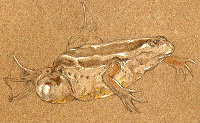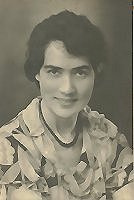
Platanna
is confined to a scattering of black water lakelets in the South Western Cape"
Illustration and text:
Liz Mc Mahon, from A Fynbos Year
 Platanna | "One of the rarest animals in fynbos, the Cape Platanna Xenopus gilli is confined to a scattering of black water lakelets in the South Western Cape" Illustration and text: Liz Mc Mahon, from A Fynbos Year |

First woman in South Africa to achieve a Doctorate in ScienceExcerpt: a short piece of prose from Haai waar was jy? (1949)
Louise Latsky was born on 22 October 1901 in Carnarvon, as the second child of
the Rev. Christoffel Hermanus Engelbertus Latsky and Mrs Johanna Maria Latsky
(née Sterrenberg) When she was about five, her family moved to Stellenbosch,
where her father was minister of the newly-established Dutch Reformed Mission
Church, in Bird Street (now the Baptist church building).
For the first few years she attended the mission school run by her maternal
aunt, Miss Lulu Sterrenberg, behind the church. At Std Four level she moved to
Bloemhof School for Girls, where she later matriculated, with Latin and some
scientific subjects. While still at school, she requested the head, Miss Lucy
Joubert, to allow her to take Greek with the boys of the Boys' High School
(later Paul Roos Gymnasium) but was dismissed by Miss Lucy as a naughty little
girl. Lulu Latsky studied Zoology and Botany at Stellenbosch University (BSc
and MSc). She served on the Students' Representative Council, as one of the
first women to achieve this. She obtained a DSc in Zoology in circa 1931, the
first woman in South Africa to achieve a Doctorate in Science.
During 1932 she lectured in Zoology at the Potchefstroom University, but
increasingly poor health brought her academic career to an end, and she
returned to Stellenbosch, where she cared for her parents and aunt until their
old age, and started making a name for herself with children's books that
taught real facts about animals in a playful way. Her books were always
hand-written , on blocks of writing paper (writing pads). From about 1943
until 1950 or 1951 she acted as children's science editor for the Nasionale
Pers and collaborated in the publication of the Kennis vir Almal series, to
which she also contributed nine titles.
She never married, but had many local friends, who visited her regularly, and
she corresponded with others throughout the country. Lulu Latsky, beside being
very devout, had a great talent for people and seemed instinctively to
understand children, although she never had any of her own. Conversations with
her always left one feeling good about oneself. She had the knack of
concentrating her interest upon her interlocutor as if the other person in a
conversation was the most important person in the world. She was much loved by
the people around her , also those who helped her in her increasingly feeble
physical state, and would thank the woman who brought her her lunch or tea as
if it was an exceptional service and to her it was. Although she could pour
out her small energy on others, she was always amazed and touched when anyone
did anything for her.
She had been a very pretty young girl, and retained an interest in clothing and
looking nice even when she became a total invalid.
In the fifties, after the death of her father, she, her mother and elder
brother, SJ Latsky, who was also an invalid, moved to Sea Point, and later,
after the deaths of the other two, she moved to Tamboerskloof, to be near one
of her younger brothers, Peter Latsky, to whom she had always been very close.
He and his wife cared for her until the end, and Lulu Latsky died in
Tamboerskloof, Cape Town, on 8 November 1980, about an hour after a last long
telephone conversation with her brother.
| Children's books about animals: Familie van Flerrie. Kaapstad, Maskew Miller Pikkewynland lewe, NP Almal wat leef, haal asem. Kaapstad, Maskew Miller Dierevreugde en diereverdriet, AP Mevrou Hen die wêreld in, AP Oubaas Eina, NP 1938: Natuurlike rytuie, NP 1941: Bere gaan te kere, NP 1942: Rooibokkie, NP Sosiale lewe in die natuur. Vol no 6, Kennis vir almal, NP, 1944 Ouersorg. Vol no 17, Kennis vir almal, NP, 1944 Penman se kleinspan, NP, 1945 Oëverblindery. Vol no 36, Kennis vir almal, NP, 1945 Diknek en Dikoog, NP, 1946 Oupa Bewer, NP, 1947 Koning Gorilla hou vergadering (of Mammalia), NP, 1947 Lelik in die knyp, NP, 1947 Voorsorg, NP, 1947 | Die wêreld is honger. Vol no 49, Kennis vir almal, NP, 1948 Kleinbaas Eina, NP, 1948 Haai, waar was jy? , AP, 1949 Liefde in Pikkewynland, NP, 1949 Huise en paleise. Vol no 70, Kennis vir almal, NP, 1950 Oorlog in die diereryk. Vol no 72, Kennis vir almal, NP, 1950 "Skaam jou, Pietjie!", AP, 1951 Die tannie dros weg, AP, 1951 Liefde in Volstruisland, AP, 1951 Die diere hou konsert, AP, 1953 Soveel diere soveel dinge. Pretoria, Van Schaik, 1960 Other books: |
Excerpt: a short piece of prose from Haai waar was jy? (1949):
... Dassie en die muisvroutjie lag nie meer nie. Daar in die dam is die padda 'n
nuwe man. Hulle het nader gekom en sit nou vlak voor hom voor die water; Dassie
bo-op 'n ronde klip en Ma-muis skuins onder. Hulle oë bly op Platanna want dié
is soos 'n vis in die water. Op en af en heen en weer skiet hy deur die dam. Om
dan weer 'n paar ratse swaaie en draaie te maak. Jy sou nooit sê dis dieselfde
kêrel wat op land nie eens ordentlik reg-op kon sit nie.
Ja-nee, dis waar,, jy is 'n ou windmaker in die water, lag Dassie goedig.
Kom terug jong, kom nader, ek kan nie mooi sien nie, jy is al so ver.
Skaars was haar woorde koud of die paddaman spring agteruit, vinnig en rats.
Goeiste Platanna, maar kyk hoe maak jy my skrik. Ek het nooit geweet 'n padda
kan so behendig agteruiit in die water spring nie.
Platanna lê nou op die rand van die dammetjie en skud soos hy lag. Moet jou
nie verbeel dat al die paddas hierdie kuns ken nie. Weet jy, sover bekend is
ons platannas die enigste soort wat hierdie kuns ken. Al sukkel ek so oor die
land kan ek selfs op droë grond ook so agteruit spring. Nie net in die water
nie.
Die padda-kêrel skiet soos 'n blits verby die neus van Ma-muis en dit agteruit.
Die muisvroutjie koes weg, sy is lam geskrik, maar Dassie wat die affêre van
die hoogte af goed beskou het, lag tog te lekker.
Platanna het iets gewaar, iets wat roer, 'n lekker happie. Sy mond lus en sy
maag praat en hy sien nie meer vir Dassie of Ma-muis eens raak nie.
Uit skiet sy hand. Hy pak die klein skepseltjjie wat daar in die modder lê en
kriewel met geweld beet en hou die wurm aan weerskante vas. Hy het mos nie
verniet die twee oulike handjies met die vier vurkagtige vingers aan elke
hand gekry nie. 'n Paar stote met die vingers en die wurm is nie meer nie, hy
het binne die mond van die padda verdwyn.
Goeie genugtig Platanna, sê Dassie. Het ek nie geweet jy is 'n padda nie,
sou ek werklik gedink het jy is 'n soort mens. Jy eet dan byna soos hulle, met
hande en vingers.
Dassie skuiwe ongemaklik rond. Sy hou nie van mense nie, hulle is wreed en
geniepsig. Nooit sal die mens tog 'n kans laat verbygaan om hulle arme dassies
te vervolg en dood te maak nie. En dit omdat mense al hulle, wat dassies is, se
plantkos in die veld aan die ou skape en bokke wil gee....
Weet jy man, ek het nooit geweet julle paddas eet so nie, lok Dassie uit om
verder te hoor.
Julle paddas! Verbeel jou! skree Rana, een van die gewone ou grys paddas uit.
Hy wip lugtig agter 'n blaar om. Nes of ons paddas almal so laf is om so te
eet. Moet asseblief nie vir ons almal onder een kam met daardie stuitige ou
platanna skeer nie....
Weet julle hoekom Platanna so eet? Omdat hy nie 'n tong het nie. Daar is nog
net twee nader soorte paddas in die hele wêreld behalwe Platanna wat ook nie 'n
tong het nie. Die meeste van ons ander paddas is almal met 'n mooi werklustige
tong uitgerus. Dis 'n lang klewerige tong. Julle moet net sien hoe vinnig ons
dit kan uitskiet en kos daarmee kan vang....
Dis nou weer te sê, lag Dassie. Jy, Platanna sonder 'n tong en ek sonder 'n
stert.
Piep, piep, piep. Die oë van muisie fonkel van pure ondeundheid. Wat praat
jy Dassie! Ou Platanna sit sonder altwee, tong en stert. En ek die muis het
albei. Ek klop julle altwee.
Tosiens vriende, skree Muis-vroutjie en daar trek sy die veld in. Sy kan nie
nog langer gesels nie, haar kleinspan wag by die huis.
Jammer Platanna kan dit nie regkry om vuis te maak nie, hy voel daarna...
Text by Jo-Marie Claassen, a niece of Lulu Latsky
![]() www.StellenboschWriters.com © Rosemarie Breuer
www.StellenboschWriters.com © Rosemarie Breuer